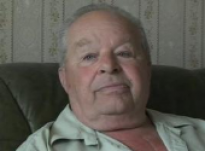Brian - Interview 08

More about me...
Brian had previously had heart problems, including a heart attack in 2002, which led to a triple heart bypass operation in 2003, and atrial fibrillation in 2008. Since then his health had been OK, but one afternoon in March 2010 he was sitting at home when he realised he couldn’t see the TV properly and he felt woozy and strange. He asked his wife to fetch his blood pressure monitor but his blood pressure seemed normal. He tried to get up and move across the room, but he couldn’t walk properly, and it felt as if he were drunk.
Brian’s wife thought something was wrong, particularly given his past history, and dialled 999 for an ambulance. The paramedics did various tests and took him to hospital, where he was kept in overnight and then sent home. At first there was a query as to whether he had had a stroke or a TIA, but it was decided it was a TIA. Before discharge, Brian was asked if he would take part in a research project, and he agreed. Being in the research has involved having MRI, CT and Doppler scans, and doing some tests of mental functioning. He monitors his own blood pressure regularly and takes the readings in for the research staff. Brian feels the research could help other people, but also finds it reassuring that he gets closely monitored as a result of taking part. He likes the feeling that he can ask all the questions he wants to because research staff seem to have more time to spend with you to explain things (though Brian feels his care has been excellent throughout). He encourages other people to ask questions if they don’t understand something.
Brian’s wife Rosemary also volunteered for the research to be a healthy member of the control group. She has also been interviewed (see TIA09).
There is some family history of stroke, including Brian’s mother, who was seriously disabled as a result of stroke and never came out of hospital. One of Brian’s elderly neighbours has also had a TIA and his sister-in-law has had a stroke, so he talks to them about their experiences, but does not go to any support groups. It is now four months since the TIA and he has had no further symptoms. Mostly he tries to push it to the back of his mind that he has had a TIA and not let it worry him. It has not really affected his life. Immediately after the TIA he was asked not to drive. His advice to others is to follow professional advice but not to panic.
Brian’s own symptoms were rather different to those shown in the FAST campaign (facial weakness, arm weakness or numbness and speech problems), but he and his wife knew something was wrong because of past experience of other medical conditions and knowing others who have had a stroke. He feels it’s important that people should feel able to dial 999 to get help quickly if they think something is wrong, but he also would not want to make people feel too anxious. It is a difficult balance to get right.
Brian felt that everyone he had come into contact with during his treatment had done a wonderful job
Brian felt that everyone he had come into contact with during his treatment had done a wonderful job
Brian's consultant said he'd had a 'small stroke' which he thinks means the same thing as a mini stroke, or TIA
Brian's consultant said he'd had a 'small stroke' which he thinks means the same thing as a mini stroke, or TIA
Who actually told you it was TIA? Was it the ambulance staff, or was it in the hospital?
Brian was approached about taking part in a research study while he was on the ward. He took part mainly to help other people, but later he was also glad of the extra monitoring
Brian was approached about taking part in a research study while he was on the ward. He took part mainly to help other people, but later he was also glad of the extra monitoring
And at what point where you asked if you’d be willing to take part in the TIA research programme?
Brian is philosophical about his illness and finds ways to distract himself from thinking about it all too much
Brian is philosophical about his illness and finds ways to distract himself from thinking about it all too much
I’m inclined to be perhaps a realist, thinking that one man’s meat is another man’s poison, as it were [laughs]. Everybody has different opinions and I feel, you know, that when my time comes and the good Lord beckons, that will be it.

